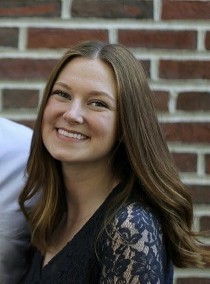Kayla Matthews
School: Simmons College
Major: Behavior Analysis

My goal is to ultimately work with children who have physical handicaps, disabilities, and disorders. I am interested in opportunities for observing and assessing play, engaging in preoperative teaching, developing relationships with clients, families, and staff. Through graduating with my Masters in Science in Behavioral Analysis from Simmons College, I plan to earn my BCBA (Board Certified Behavioral Analyst credential) and treat children and their families by creating a therapeutic environment for learning and understanding that leads to the child's success. I feel that these children must be given encouragement and opportunities to perform in non-conventional ways.
My current position as a Applied Behavioral Analysis Therapist has only solidified my adoration and enthusiasm for furthering my career in Behavioral Analysis. I provide direct service to children on a 1:1 basis and as an ABA Therapist my responsibilities include: implementing Individualized Treatment Plans (ITPs), 1:1 Discrete Trial Training (DTT) sessions, small groups with 1:1 support, social skills groups, and parent training.
I know I have a challenging academic journey ahead of me, but if it were not for my passion of assisting others, I would not be able to endure the rigorous process of becoming a Board Certified Behavioral Analyst. I believe an important step for me is studying the field of Behavioral Analysis and those extensive requirements will help me reflect deeply on my right to claim the title of Kayla Matthews, BCBA. This process of becoming a therapist to me seems essential to my training so I can provide the best possible care to the children I hope to work with.
For fun I partake in my love for art, hike with my dog, and volunteer as a peer mentor at my local youth group, as well as offer my time as an Art Therapy volunteer for Dana-Farber Cancer Institute.
Essay: LEGO-Based Therapy
As a graduate of Emmanuel College with my Bachelor of Arts in Art Therapy, I have been exposed to dozens of therapeutic techniques that can enhance the well-being of a wide range of clients. During my practicum course, I conducted a 16-week long intervention with children diagnosed with Autism Spectrum Disorder. The participants selected for the treatment met specific criteria that included symptoms of their disability I aimed to treat, including: repetitive body movements, hyper-reactivity to sensory input, lack of coordination, and lack of social skills.
Specifically, I implemented "The LEGO Club," adhering to an evidence-based program with outcome studies that have shown children receiving LEGO-Based Therapy present improvement in social competence, hand-eye coordination, and a decrease in maladaptive behavior. The LEGO-Based play materials present as an effective medium when working with children on the Spectrum.
Since these individuals look forward to playing with LEGOs, rather than going to a typical (physical, occupational, or behavioral) therapy session, the materials strongly improve the willingness of clients to engage in therapeutic activities. LEGO-Based Therapy takes full advantage of the inherently rewarding nature of LEGO building while also administering skills to improve the child's debilitating symptoms. The client acquires skills related to speech and communication, as they must request LEGO pieces while communicating and understanding directions for where a piece must go on the project. The client also works on their hand-eye coordination, first finding the LEGO piece amongst the other blocks, understanding where the piece must fit onto the project, and then physically placing the block into the correct place.
The projects begin with smaller "builds," first with 50 pieces in a set, and continue to grow in size based on improvement of skills and ability to construct a more detailed project. The participants in my treatment program began first by practicing stacking LEGO blocks onto one another before building a project. Two of the six participants began with larger, DUPLO LEGO blocks as their disability, specifically decrease hand/finger strength and manipulation, was more severe. They needed to first achieve the ability to connect blocks together. Once this skill was mastered, the group began assembling projects over the next fourteen weeks.
By the end of the 16-week program, all six clients enhanced in the targeted areas. It was noted that the majority of individuals continued their practice at home with siblings and parents, further improving their symptoms. If this therapeutic technique was added to physical, occupational, and behavioral therapists repertoires, they would have an intervention geared towards their clients' interests as well as their needs.